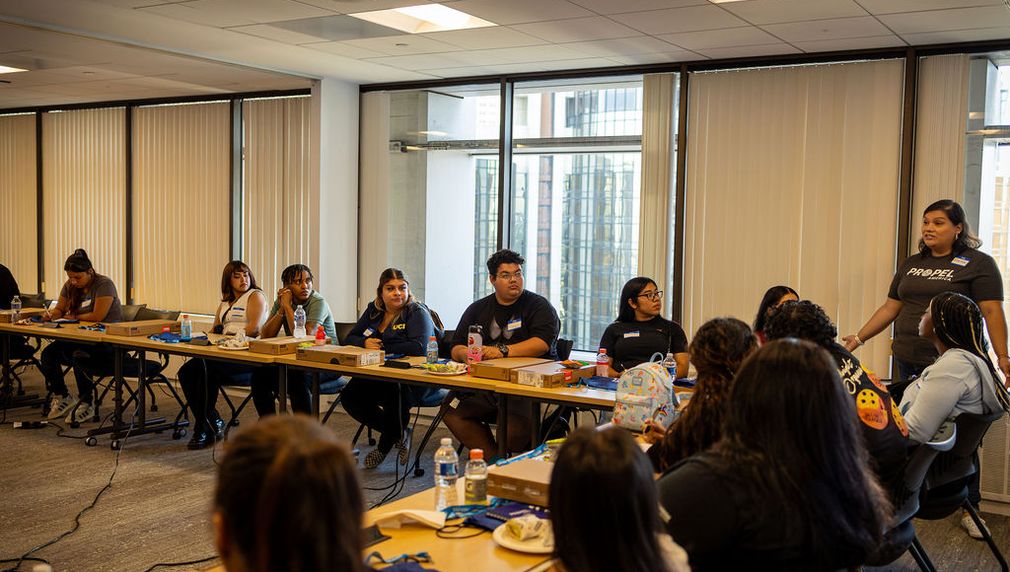Scaling Healthcare Apprenticeships in Los Angeles County
Propel’s Medical Assistant training and Apprenticeship program and partnership with employer CCALAC addresses California’s healthcare workforce crisis by training and placing diverse, low-income young adults in high-demand allied health roles at no cost to learners. In LAs, Propel will enroll 65 Fellows in 2025 and 110 in 2026, providing paid training and placement support and expand employer partnerships to meet urgent staffing needs. Fellows train for an industry-aligned credential, receive a stipend and all supplies, and on-the-job coachin

What is the primary issue area that your application will impact?
Youth economic advancement
In which areas of Los Angeles will you be directly working?
City of Los Angeles (select only if your project has a citywide benefit) County of Los Angeles (select only if your project has a countywide benefit)
In what stage of innovation is this project, program, or initiative?
Expand existing project, program, or initiative (expanding and continuing ongoing, successful work)
What is your understanding of the issue that you are seeking to address?
California’s healthcare workforce shortage has reached crisis levels, threatening access to timely and equitable care—particularly in Los Angeles. Allied health professionals, including medical assistants, make up 60% of the health workforce, yet there remains a projected shortfall of 500,000 workers by 2024, with 65,000 annual openings in high-demand roles alone (California Competes, 2021). At the same time, young adults in Los Angeles—especially from underrepresented and low-income communities—face limited, inequitable postsecondary options. Many are disconnected from both school and work or are in low-wage roles without viable career advancement (Brookings Institute). Propel America is uniquely positioned to address both challenges. In 2024, we received 327 applications in Los Angeles, established over 25 partnerships with local school districts and community-based organizations, and integrated with CCALAC, one of the largest associations of FQHCs in the region.
Describe the project, program, or initiative this grant will support to address the issue.
Propel seeks support to expand our Medical Assistant (MA) training and apprenticeship programs in 2026, building on our mission to connect underinvested young adults to career pathways in healthcare. Propel provides free, flexible technical training aligned with workforce demand, in partnership with training providers and healthcare employers. Each Fellow receives a laptop, stipend, access to emergency funds, technical instruction, and career coaching during training and six months post-placement to ensure long-term success.
With over 327 applications in LA in 2024 and partnerships with 25+ local organizations, the demand for accessible, job-linked training is clear. At the same time, employer demand for MAs far exceeds the capacity of local training providers. To meet this need, Propel will launch a registered MA apprenticeship in Fall 2025 in partnership with Loyola Marymount University and CCALAC and expand our more traditional train to earn MA training program with training partner Cengage and CCALAC. This earn-and-learn initiative allows fellows to earn wages as early as week three while receiving skills training and coaching. Supported by the California Opportunity Youth Apprenticeship grant, this model shows 90% retention rates—offers a sustainable workforce solution and creates economic mobility for young adults. Propel will also deliver employability skills instruction and continue building community partnerships to support recruitment and success.
Describe how Los Angeles County will be different if your work is successful.
If Propel’s work is successful, Los Angeles County will experience a stronger, more equitable healthcare workforce and expanded economic opportunity for underrepresented young adults. Dozens of clinics will have access to a reliable pipeline of trained, certified medical assistants, helping address the projected shortfall of allied health workers. Young adults—95% of whom identify as people of color based on those we’ve recruited in the past—will gain access to free, job-linked training, and become apprentices earning living wages almost immediately , Our dual solution model will help build community wealth, workforce stability for hundreds of young people, and more equitable healthcare. As more apprentices advance into meaningful full-time healthcare roles, more young people will gain awareness of their career and financial mobility potential.
Approximately how many people will be impacted by this project, program, or initiative?
Direct Impact: 175
Indirect Impact: 1,700